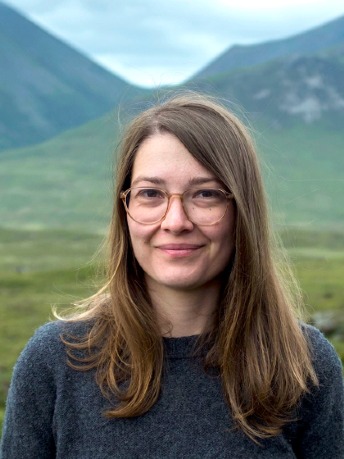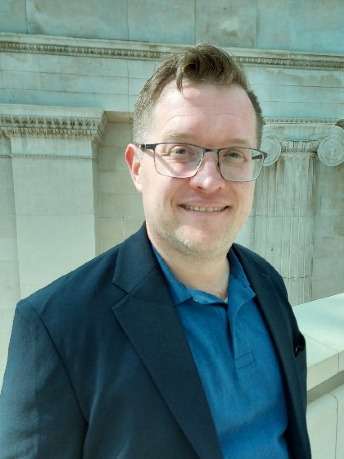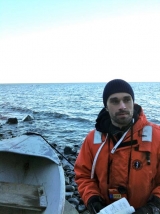ERC Starting Grants voor drie RUG-onderzoekers
Drie onderzoekers van de Rijksuniversiteit Groningen (RUG), allen van de Faculteit der Letteren, ontvangen een European Research Council (ERC) Starting Grant: Yuliya Hilevych , Geoff Hobbis en Sean Desjardins . De Starting Grants bestaan uit elk €1.5 miljoen voor een periode van vijf jaar. Uitmuntende Europese onderzoekers die baanbrekend onderzoek doen komen in aanmerking voor de beurzen.

Yuliya Hilevych
Coping with decline: Comparative social-historical analysis of depopulation and community welfare in Europe, 1950-2022 (DEPOP)
Lange tijd groeide de bevolking van Europa. De voorspelling is echter dat de bevolking ná 2023 juist af blijft nemen. Een belangrijke reden voor deze afname is regionale ontvolking, een afname in bevolking en welvaart in bepaalde gebieden sinds de jaren 1950. We weten nog weinig over de verbondenheid tussen deze twee afnames en hoe de betrokken gemeenschappen hiermee omgaan.
Mijn team en ik willen hierop ingaan door een sociale geschiedenis van ontvolking in Europa te maken, de eerste in zijn soort. DEPOP zet de verhalen van de ‘blijvers’ in rurale en stedelijke gemeenschappen in een nieuw daglicht. Daarbij kijken we naar hun welvaart op het gebied van gezondheid en zorg door nauw te kijken naar de rol van gender, klasse, leeftijd, bekwaamheid en etniciteit. We richten ons op de Noord-West-Oost-vergelijking: Finland - Nederland - Oekraïne.
Door dit te doen, zal DEPOP regionale ontvolking belichten als een krachtig voorbeeld van een traag brandende crisis - die zich over langere perioden voordoet. Onze historische bevindingen zullen helpen om beter te begrijpen hoe en waarom sommige gemeenschappen veerkrachtiger zijn geweest in de langzame crisis van ontvolking.

Geoff Hobbis
Digitizing Other Economies
Is economische diversiteit mogelijk in het digitale tijdperk? Zo ja, in welke mate en hoe ziet het eruit? In zijn ERC-project 'DOE' zal Geoffrey Hobbis deze vragen onderzoeken op basis van intercultureel vergelijkend onderzoek onder al lang bestaande 'andere' economieën - jager-verzamelaars, pastoralisten, tuinbouwers en niet-industriële landbouwers. Leden van deze economieën zijn in hun leven steeds afhankelijker van digitale technologieën, met name smartphones. Sommigen denken dat deze nieuwe technologieën de assimilatie in het industrieel-kapitalisme zullen vergemakkelijken. De meeste digitale technologieën zijn immers ontworpen volgens en voor de belangen, behoeften en waarden van het industrieel-kapitalisme. DOE daagt dit simplistische, deterministische perspectief uit. In plaats daarvan wil het de diversiteit van economische aanpassingen in het digitale tijdperk laten zien.

Sean Desjardins
TRACES
Foxe Basin (Tracking Long-term Resilience in Arctic Sociocultural-Ecological Systems) is een vijfjarig, interdisciplinair project met als doel een beter begrip te krijgen van de verschillen tussen de westerse wetenschappelijke opvattingen over duurzaamheid/behoud en de aloude traditionele kennis van de Inuit over een gezond milieu en de relaties tussen mens en dier. Dit zal worden bereikt door onderzoek naar (1) moderne zelfvoorzienende jacht door Inuit (op bijvoorbeeld zeehonden, walrussen en kariboes), (2) de archeologie van oogsten in het verleden (van ca. 1300 na Christus tot nu), (3) traditionele kennis van Inuit over de jacht en bredere relaties met dieren, en (4) circumpolair overheidsbeleid over de regulering van een breed scala aan diergerelateerde activiteiten, zoals jagen, naaien en snijden. Het TRACES-team is gevestigd in het Arctisch Centrum van het Groningse Instituut voor Archeologie en zal het onderzoek samen met Inuit-kennis- en rechthebbenden uitvoeren in de biogeografisch-dynamische Foxe Basin regio van Nunavut, Inuit Nunangat (het traditionele land, water en ijs van het huidige Canada).
Meer over ERC
ERC ondersteunt talentvolle jonge onderzoekers bij het opzetten van een onderzoeksteam en het starten van een onafhankelijk onderzoeksproject. Een ERC-beurs stelt deze onderzoekers in staat gedurfd, baanbrekend onderzoek op te starten en binnen hun vakgebied nieuwe wegen in te slaan.
Meer nieuws
-
14 februari 2026
Tumor weg, maar waar zijn de woorden?
-
19 januari 2026
Digitalisering drijft kansarme burgers soms in het nauw
